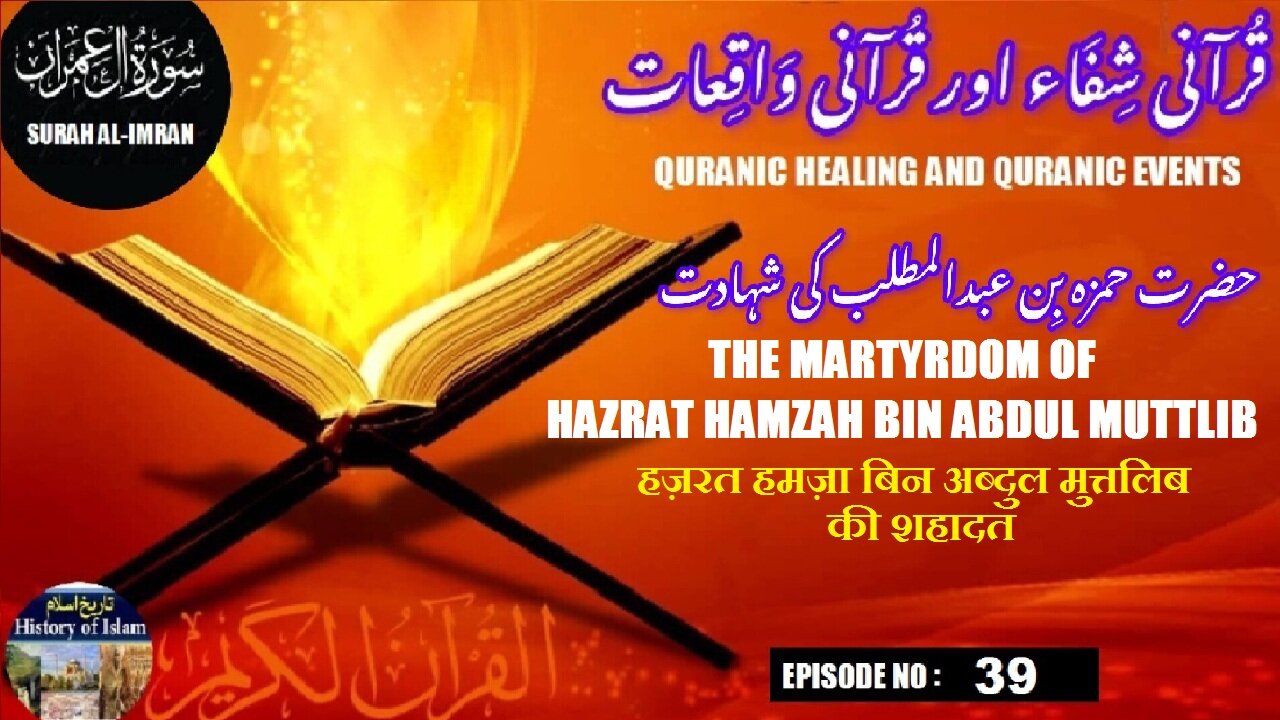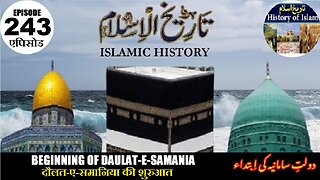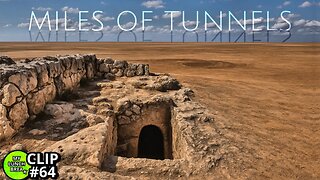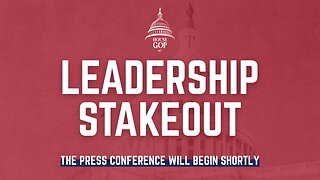Premium Only Content

The martyrdom of Hazrat Hamzah bin Abdul Muttalib शहादत हमजा حضرت حمزہ بن عبدالمطلب کی شہادت
@islamichistory813 #martyrdom #hamza #ibn #abdul #muttalib #battle #of #uhud #hamzaibnabdulmuttalibra #biography #hamzaibnabdulmuttaliblegacy #the #ultimate #quote #of #hamzah #ibn #abdul #muttalib
The Martyrdom of Hamza ibn Abdul Muttalib
Assalamu Alaikum wa Rahmatullahi wa Barakatuhu.
Brothers, sisters, friends and elders, we welcome you to the 39 episode of the Islamic informative videos based on healing and incidents from the Holy Quran. In this video, we will described: The Martyrdom of Hamza ibn Abdul Muttalib
The martyrdom of Hamza ibn Abdul Muttalib, the beloved uncle of the Prophet Muhammad (PBUH), stands as one of the most heart-wrenching and heroic episodes in early Islamic history. Though Surah Aal-e-Imran does not explicitly mention his name, the verses referring to the Battle of Uhud indirectly allude to the great losses and sacrifices endured by the believers—none more significant than the loss of Hamza. Known as “Asadullah” (The Lion of Allah), Hamza was a fearless warrior, a firm believer, and a source of immense strength and morale for the Muslim community. His death was not only a personal tragedy for the Prophet (PBUH), but a powerful reminder of the high cost of standing firm in the path of truth.
During the Battle of Uhud, the Muslims initially gained the upper hand against the Quraysh. However, due to a moment of disobedience when some of the Muslim archers left their assigned positions, the tide of the battle turned. The Quraysh forces, led by skilled warriors like Khalid ibn al-Walid, took advantage of the exposed flank and launched a surprise counterattack. Amid the chaos and confusion, many Muslims were martyred, and one of the most painful losses was that of Hamza.
Hamza was targeted specifically by Wahshi ibn Harb, an Abyssinian slave promised his freedom by Hind bint Utbah, the wife of Abu Sufyan, if he succeeded in killing him. Hind sought revenge for her father and brother, who had been killed by Muslims in previous battles. Wahshi, a skilled spear-thrower, lay in wait for Hamza and eventually struck him with a deadly blow, martyring him in the midst of battle. After his death, his body was mutilated by Hind, who ordered his chest to be torn open and his liver chewed—a desecration that deeply wounded the heart of the Prophet Muhammad (PBUH).
The Qur’anic verses in Surah Aal-e-Imran that speak of the pain, loss, and perseverance following Uhud are often understood by scholars as reflections on the sacrifices of noble companions like Hamza. His martyrdom symbolized the price of faith and the depth of commitment required in the struggle for Islam. Despite the brutal loss, the Prophet (PBUH) showed immense patience and trust in Allah’s wisdom. He never sought personal revenge, even when he later met Wahshi after his conversion to Islam, although the memory of Hamza’s death always remained with him.
Hamza's martyrdom became a turning point in the Muslim community’s understanding of sacrifice. It reminded them that no one, not even the dearest relatives of the Prophet, were spared in the path of Allah. His courage and loyalty continue to inspire generations of Muslims who remember him not only as a warrior but as a true martyr who gave his life for the sake of truth.
In conclusion, the death of Hamza ibn Abdul Muttalib during the Battle of Uhud, though not named in Surah Aal-e-Imran, is a vital part of the event’s emotional and spiritual weight. His martyrdom highlighted the seriousness of the Muslim mission and the personal cost borne by those who carried it forward.
With this, we ask for your permission until tomorrow and pray to Allah Almighty to grant us the ability to act on the Quran and Hadith, Amen
Allah Hafiz
============================
-
 12:36
12:36
ISLAMIC HISTORY
1 hour agoIslamic History Episode 243 Beginning of Samania दौलत-ए-समानिया की शुरुआत دولت سا ما نیہ کی ابتدا
1 -
 LIVE
LIVE
MYLUNCHBREAK CHANNEL PAGE
3 hours ago1000's of Miles of Tunnels
562 watching -
 LIVE
LIVE
The Big Mig™
2 hours agoSchumer Government Shutdown Screwing America AGAIN!
6,637 watching -
 LIVE
LIVE
Bannons War Room
7 months agoWarRoom Live
13,231 watching -
 1:09:26
1:09:26
Benny Johnson
1 hour agoDemocrats Throw Hysterical MELTDOWN As Trump Gives Them 'Trump 2028' Hats, Trolls With 'Racist' Meme
30.5K22 -
 1:35:09
1:35:09
Dear America
3 hours agoDems Cause a Gov SHUTDOWN!! Remember THEY HATE YOU! + Bomb Threat At TPUSA Event!!
89.7K72 -
 LIVE
LIVE
Badlands Media
10 hours agoBadlands Daily: October 1, 2025
3,930 watching -
 2:14:56
2:14:56
Matt Kohrs
11 hours agoGov'nt Shutdown: Stocks Whipsaw, Bitcoin Pops & Gold Hits Record || Live Trading
36.4K1 -
 LIVE
LIVE
Law&Crime
2 hours ago $0.38 earnedLIVE: Gun-Cleaning Gone Deadly Trial – FL v. Leslie Boileau – Day 1
68 watching -
 30:52
30:52
House Republicans
1 hour agoHouse Republicans Leadership Stakeout
2.66K2